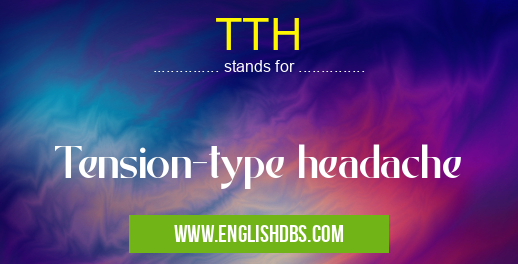What does TTH mean in CLINICAL MEDICINE
Tension-type headache (TTH) is the most common type of headache, affecting up to 90% of the population worldwide.

TTH meaning in Clinical Medicine in Medical
TTH mostly used in an acronym Clinical Medicine in Category Medical that means Tension-type headache
Shorthand: TTH,
Full Form: Tension-type headache
For more information of "Tension-type headache", see the section below.
Definition
TTH is characterized by a mild to moderate, aching or pressing pain on both sides of the head. The pain typically lasts for 30 minutes to several hours and can be aggravated by physical activity or emotional stress.
Causes
The exact cause of TTH is unknown, but it is believed to be related to muscle tension in the head, neck, and shoulders. Other factors that may contribute to TTH include:
- Stress
- Anxiety
- Depression
- Fatigue
- Poor posture
- Caffeine withdrawal
- Alcohol consumption
Symptoms
TTH can cause a variety of symptoms, including:
- Mild to moderate, aching or pressing pain on both sides of the head
- Pain that lasts for 30 minutes to several hours
- Aggravation of pain with physical activity or emotional stress
- Tenderness of the scalp, neck, or shoulders
- Difficulty concentrating
- Fatigue
- Irritability
Diagnosis
TTH is diagnosed based on a patient's symptoms and a physical examination. There is no specific test to diagnose TTH.
Treatment
Treatment for TTH typically involves:
- Over-the-counter pain relievers, such as ibuprofen or acetaminophen
- Prescription pain relievers
- Muscle relaxants
- Physical therapy
- Acupuncture
- Stress management techniques
Essential Questions and Answers on Tension-type headache in "MEDICAL»CLINICAL"
What is a tension-type headache (TTH)?
A tension-type headache is a common type of headache that is characterized by a tight or constricting sensation around the head. It is often described as a "band" or "vise" around the head. TTHs can range in intensity from mild to moderate, and they can last anywhere from 30 minutes to several hours.
What are the symptoms of a tension-type headache?
The most common symptom of a tension-type headache is a dull, aching pain in the head. The pain is often described as a "band" or "vise" around the head, and it may be accompanied by other symptoms, such as:
- Tenderness or tightness in the muscles of the head, neck, and shoulders
- Sensitivity to light and sound
- Nausea
- Vomiting
- Fatigue
What causes tension-type headaches?
The exact cause of tension-type headaches is unknown, but they are thought to be caused by a combination of factors, including:
- Muscle tension in the head, neck, and shoulders
- Stress
- Anxiety
- Depression
- Caffeine withdrawal
- Poor posture
- Eye strain
How are tension-type headaches treated?
Treatment for tension-type headaches typically involves a combination of self-care measures and medical treatment. Self-care measures include:
- Applying heat or cold to the head
- Massaging the muscles of the head, neck, and shoulders
- Taking over-the-counter pain medication, such as ibuprofen or acetaminophen
- Getting regular exercise
- Managing stress and anxiety
When should I see a doctor for a tension-type headache?
You should see a doctor for a tension-type headache if:
- The pain is severe or does not improve with self-care measures
- The pain is accompanied by other symptoms, such as nausea or vomiting
- The pain is getting worse or more frequent
- You have other neurological symptoms, such as numbness or weakness
Final Words: TTH is a common type of headache that can be effectively treated with a variety of methods. If you experience frequent TTH, it is important to see a doctor to rule out any underlying medical conditions and to develop a treatment plan.
TTH also stands for: |
|
| All stands for TTH |
